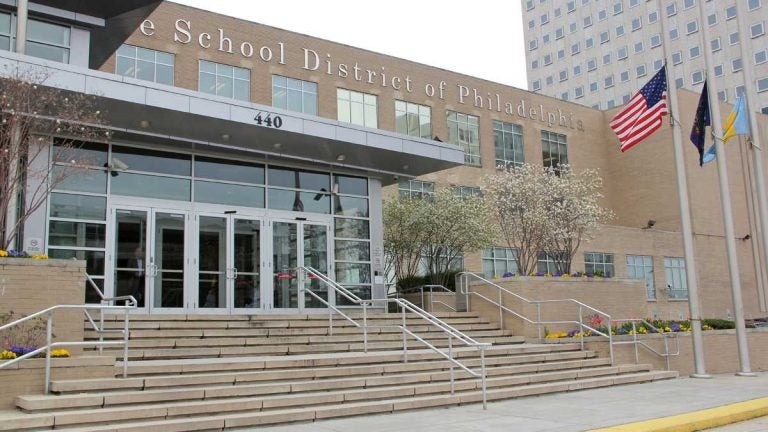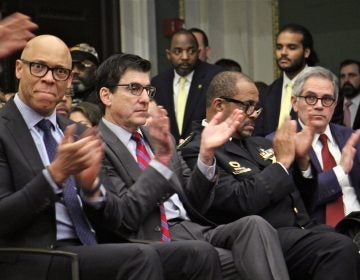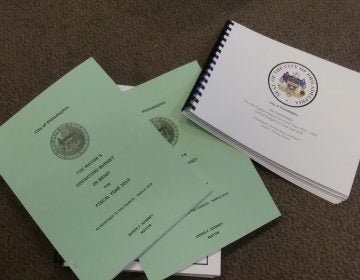With school deficits looming, Philly debates tax strategy ahead of new budget
Private-sector leaders want to reduce business taxes, but the school system's urgent financial needs could make that difficult.

Philadelphia School District headquarters (Emma Lee/WHYY)
As Philadelphia Mayor Jim Kenney readies his next proposed budget this week, a recent City Council tax policy hearing featured several familiar voices and perspectives on how he could deal with deficits looming for the city school district. The debate could foreshadow an emerging conflict over to how to fund Philadelphia’s schools at a time when the city is slated to take more control over them.
For years, business leaders have pressed Philadelphia to shift its tax burden away from business and wage taxes and toward higher real estate levies, arguing that the city’s unusual tax structure restricts job growth. The city generally has moved in that direction, though not as quickly as the business community would like.
On Wednesday, business leaders including Gerard “Jerry” Sweeney of the Brandywine Realty Trust, hammered that same message in a hearing on tax policy before City Council’s Legislative Oversight Committee.
“Our problem is our tax structure,” said Sweeney, co-author of a plan that would allow the city to tax commercial properties at a higher rate than residential properties.
Countering Sweeney were Marc Stier of the left-leaning Pennsylvania Budget and Policy Center and Jeff Hornstein, the newly-minted executive director of the Economy League of Greater Philadelphia.
Stier and Hornstein argued that the single-minded focus on tax policy was misguided. Instead, they said, the city’s growth will depend on its ability to create a strong school system and provide other core city services.
“Research connecting tax change to economic growth is not that strong,” argued Stier. “The research that points to the close connection between levels of public investment in education and economic growth, in fact, is very strong.”
Herein lies the looming showdown.
This summer, the city will reclaim control of its beleaguered public school system, which is quickly approaching a fiscal cliff. By fiscal year 2022, the district believes it will be about $700 million in the red.
| FISCAL YEAR | ENDING FUND BALANCE (PROJECTED) |
| 2018 | $85.6 million |
| 2019 | -$22.4 million |
| 2020 | -$218.1 million |
| 2021 | -$449.7 million |
| 2022 | -$701.6 million |
Upon reclaiming control of the city’ school system — which for 16 years operated under the auspices of a state-controlled board — Mayor Jim Kenney repeatedly emphasized that local investment would have to accompany local control. He also vowed the district would never be forced into austerity measures as it was during past fiscal crises, when the district laid off counselors, nurses, and other staff.
“We’re not going back to the bad old days of making that poor guy, [Superintendent William] Hite, have to cut and cut and cut,” he said in November. “It’s terrible.”
So can the city continue to cut wage and business taxes while also fulfilling its promise to fund Philadelphia’s public school system? And should it?
The case for focusing on property taxes
Some at Wednesday’s hearing clearly leaned yes, while others clearly leaned no.
Firmly in the yes camp were Sweeney, David Thornburgh, president and CEO of the Committee of Seventy, and Robert Inman, professor of finance at the University of Pennsylvania’s Wharton School of Business.
Their logic will ring familiar to those who’ve followed the tax debate over the last few decades.
It goes something like this:
Philadelphia, they argue, relies disproportionately on wage and business taxes compared with similar U.S. cities and its surrounding municipalities. In fiscal year 2017, the city’s wage tax and net-profit tax brought in $1.45 billion, its business income and receipts tax brought in $435.1 million, and its use and occupancy tax brought in $138.7 million.
These sorts of taxes on business activity and revenue keep businesses from moving to Philadelphia and creating new jobs, argued Thornburgh. He said the city has grown slower than other metropolises with similar structural barriers.
“The difference in job growth and economic prosperity, to my mind, really has to come back to something that is very distinctive — and that is our tax structure, particularly our overreliance on the wage tax,” said Thornburgh.
The alternative would be to further tax Philadelphia’s land, which, unlike its businesses, cannot up and move.
The result, they argue, would be more jobs — which would fuel further prosperity, raise property values, and boost tax collections on real estate.
Higher real estate taxes would benefit the school system, which receives 55 percent of the city’s real estate tax revenues. In fiscal year 2017, the school district received $720.5 million in local real estate taxes, by far the largest sum it collects from any one local tax.
“We should use the schools’ revenue need as the pivot point for moving our tax structure away from burdening employers and employees and focus on real estate tax increases,” Sweeney argued Wednesday.
Sweeney appeared concerned that city officials would plug the school district’s deficit by stalling progress on wage tax changes or even increasing various business taxes. He warned against that tactic.
“We can’t come out of this budget session with school funding being borne by the backs of businesses or employees,” Sweeney said.
Is role of tax policy overestimated?
To be clear, no one at Wednesday’s meeting explicitly called for City Council to raise business taxes as a means of funding public schools.
Stier and Hornstein, however, repeatedly downplayed the idea that business tax changes would spur growth. They also emphasized the importance of funding Philadelphia’s public school system, arguing the fiscal health of the school system should take precedence over a tax overhaul.
“Tax policy is not the primary driver of economic growth or business location decisions,” argued Hornstein.
In recent years, Philadelphia has grown, its unemployment rate has fallen, and it has added jobs. Though the city’s growth has been modest and geographically concentrated, Hornstein and Stier argued that it has happened without major tweaks to the city’s tax policy.
Though Philadelphia’s wage tax, for instance, has fallen over the past two decades, it has dropped only 0.0296 percent for residents and 0.0259 percent for nonresidents since 2009. Likewise, the business income and receipts tax has only fallen 0.10 percent over that same time period.
Philadelphia’s mini-resurgence, Stier argued, can be explained more accurately by shifting cultural norms that have attracted more people to city life. Because of its affordability relative to other nearby cities, Philadelphia has gained and retained residents who once flocked to the suburbs.
“That Philadelphia has been growing much faster in recent years, despite relatively small changes in taxes, suggests that the role taxes play has always been overestimated — and that these cultural factors and these material, economic factors based in technology have been far more important,” said Steir.
So if taxes aren’t that big a deal, what is?
Hornstein pointed to two main challenges, replenishing the city’s reserves and funding the school district.
“There are really only two places to get significant new revenues: raise property taxes or wage taxes,” Hornstein said in written testimony.
Hornstein isn’t in favor of raising the wage tax, but he also sounded leery of shifting too much of the burden on residents who may not be able to afford a bump in real estate taxes.
Big picture, though, Hornstein and Stier suggested that funding city schools — and avoiding the civic black eye that would accompany any school-funding crisis — was more important to Philadelphia’s future growth than any shift in tax policy.
Neither Hornstein or Stier presented a comprehensive plan for funding Philadelphia’s schools at Wednesday’s hearing, but an activist group soon plans to do just that.
No more tax breaks for businesses, coalition says
The left-leaning Our City Our Schools coalition pushed for local control of city schools, and it plans to release its vision for how to plug the district’s deficit. The plan will focus on business taxes, no doubt to the dismay of Sweeney and his allies.
Though the plan has not been finalized, Our City Our Schools members told WHYY they’ll call for an increase to the use and occupancy tax, an end to the city’s 10-year tax abatement for new and renovated properties (above a certain value threshold), and a halt to proposed reductions in the wage tax.
“This isn’t the moment for City Council and the mayor to be giving any further tax breaks or tax incentives to the wealthy in our city,” said Arielle Klagsbrun, a spokeswoman for the group. “Instead, we need really fair and reliable funding for our schools from the corporations that use city services every day.”
Our City Our Schools also wants the city to negotiate some funding contributions from universities and nonprofits, which are now exempt from paying local real estate taxes.
Kenney has dismissed that idea in the past, saying it wouldn’t produce much revenue. On Wednesday, however, Councilman Allan Domb seemed to support the idea, and said tax-exempt organizations control nearly a third of the city’s land as measured by tax value.
“You have a store called the City of Philadelphia where one out of three customers come into the store and don’t really pay for services,” said Domb. “I’m just calling it the way it is.”
As two visions for school funding emerge, the unanswered question is where City Council and the administration will fall.
Should the city raise real estate taxes even if it deals a direct blow to homeowners? Or should it focus on business taxes that risk alienating the business community and choking off job growth?
Harold Epps, the city’s director of commerce, was the only representative of Kenney’s administration who spoke at length during Wednesday’s hearing.
Epps endorsed the idea that the city should continue to reduce business taxes.
“We have made some progress, but not nearly fast enough,” Epps said. “One of my favorite lines is: ‘Everything about Philadelphia is going in the right direction, we just need to go faster.’ ”
But on the question of whether tax reductions or school funding should be the top priority, Epps played the middle ground. He said that creating a talent pipeline for employers was as important as taxes when it comes to attracting business.
“We see it every day,” Epps said. “We get asked as much about talent and workforce as we do about taxes.”
As for what the mayor thinks, Kenney will give his annual budget address Thursday.
—
Disclosure: Jerry Sweeney, who features prominently in the story, used to be on the WHYY board and was, until recently, the board chair.
WHYY is your source for fact-based, in-depth journalism and information. As a nonprofit organization, we rely on financial support from readers like you. Please give today.




